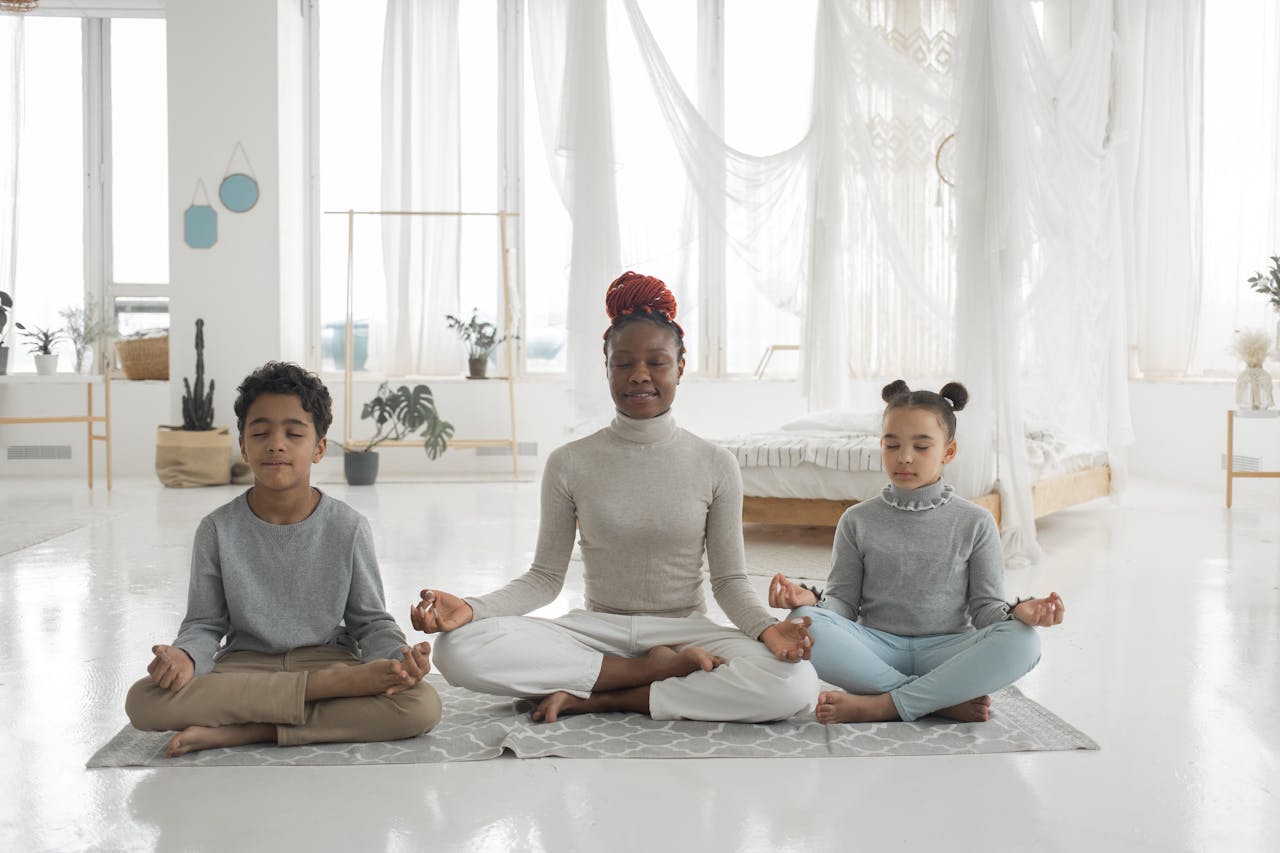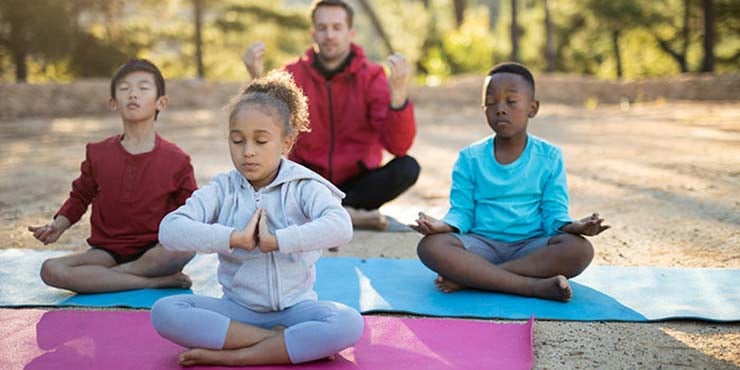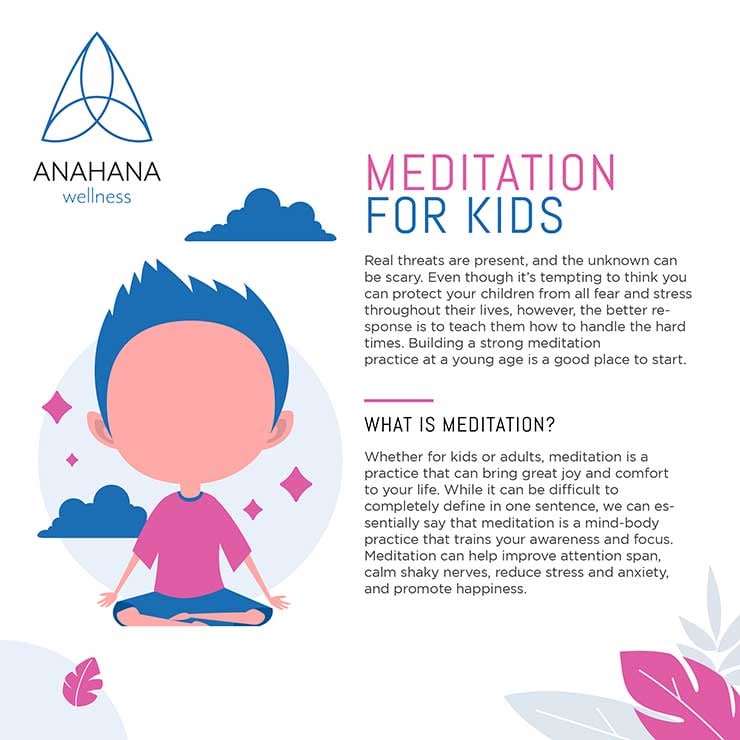5
Meditation for Kids
Last Updated: December 9, 2024

Table of Contents
Today's youth are experiencing both anxiety and stress. Way more than they should. According to a recent statistic released by the American Academy of Pediatrics,
As many as 30 percent of children and young adults will experience an anxiety disorder in their lifetime.
It falls upon parents and other caregivers to introduce our children to good stress-reducing habits and introduce children to mindfulness activities that assist them in personal growth, support mental health, develop self-control and self-esteem and reduce anxiety.
One of the best ways to do this is with meditation. We’ll dive into everything you need to know about meditation for children, including what the practice looks like, how to teach it, and why it works. Although teaching kids mindfulness practices might sound like a challenge for a parent or a teacher looking to improve the well-being of their children, once you understand what mindfulness and meditation practices are about, it will become much more manageable.
How Meditation helps Kids

In a way, it's no wonder that children develop stress disorders early. We live in a sensory-filled world. Real threats are present, and the unknown can be scary. Modern children suffer from concentration disorders and lack of focus during studies, classroom, or even in play.
It’s tempting to think you can protect your children from all fear and stress throughout their lives; the better response is to explain how to handle the hard times. Children’s meditation can help them to do so.
Building a solid meditation practice at a young age is a good intention for your children and yourself as a parent and tutor.
Whether it’s deep breathing exercises, guided meditations, sleep stories, yoga, or any other mindfulness-based interventions, there is no doubt that children of all age groups will benefit from mindfulness training from early childhood.
Diagnoses of anxiety- and behavior-related disorders in children have risen sharply.
Now, Let’s Define What Is Meditation?
Whether for kids or adults, meditation is a practice that can bring great joy and comfort to your life. While it can be challenging to define in one sentence ultimately, we can essentially say that meditation is a mind-body practice that trains your awareness and focus.
There are many benefits to meditation. For example, it can help improve attention span, calm shaky nerves, reduce stress, help to self-soothe, and promote happiness. All of these benefits are available to kids as well as adults.
Are Kids Able to Meditate?
Yes! While a child’s meditation won’t look the same as an adult’s, the basic foundation of the practice remains. Kids, for example, may benefit more from guided imagery. The duration of their sittings might be shorter. And, of course, it’s crucial to cater meditations to the child. Some, for example, won’t do well with sitting meditations longer than a few minutes. Still, they will do quite well with walking meditations outdoors, mindful drawing, sleep stories told in a soothing voice, or even listening to audio recordings as guided meditations.
Mantra meditation can spark curiosity in children of older age groups as they require
extra focus and patience, but can be a great option if your children are ready to dive deeper into
Why Is Meditation Important for Kids?
Up to 30% of youths will develop anxiety disorders.
— The American Academy of Pediatrics
Kids are not immune to the stresses of life. Diagnosis of anxiety- and behavior-related disorders in children have risen sharply in recent years. These include attention deficit disorder (ADD), attention-deficit/hyperactivity disorder (ADHD), and obsessive-compulsive disorder. First, this tells us a few things as our understanding of how behavior disorders manifest in children grows. Secondly, diagnosis rates increase as children get tested and diagnosed with those disorders. In other words, kids today are not necessarily more stressed than kids in the past. However, this also tells us that kids are more affected by anxiety and stressors than we previously thought. As parents, we need to be vigilant in helping our kids tackle life stressors and introduce self-care into their lives from a young age.
Will Meditation Help With Stress in Kids?
Yes. Fortunately, meditation works to soothe the symptoms related to problematic disorders. Kids' meditations have the same effects as adult practices. Even short, easy meditation for beginners can have astoundingly positive effects. A recent study from The Journal of Positive Psychology found that just 15 minutes of meditation had similar positive outcomes to a full day off on vacation.
Types of Meditation for Children
-
Guided Meditation for Kids: live or recorded guided meditation where the instructor recites instructions for the meditation session.
-
Meditation for Sleep: These meditations are softer and extra soothing. Often featuring a meditation with music, they calm the mind and prepare the body for sleep.
-
Mindfulness Meditation: Meditation and mindfulness simply go together. Mindfulness meditation means being mindful (paying full attention) to the present moment instead of focusing on the past or future.
The Benefits of Meditation for Kids
With meditation, kids can learn:
1. How to breathe correctly.
Many people learn how to breathe improperly (not profoundly) when they are kids. Meditation can help teach better-breathing habits. A deep breath helps with focus and relaxation, which teens, children, and even young adults might not be aware of and express in their way.
2. How to manage stress and anxiety.
Meditation helps refocus the mind and calm frantic thoughts and jarring, stressful emotions.
3. Better focus.
Mindfulness meditation, especially, can be beneficial in improving focus. That’s because it takes substantial attention and awareness to stay present.
4. How to calm down and regulate difficult emotions.
Often, children get keyed up with strong emotions and have no idea how to come down again. Meditation helps center the mind and provides a calming “cushion” for difficult emotions. If your child likes music, consider downloading some meditation that includes kid's music. Audio recording can be played before bed or in the morning as they prepare to start their day.
5. How to sleep better.
If you’re looking to use meditation for kids' bedtime, this is an excellent idea. Kids' bedtime meditation can help alleviate some of the issues they experience during rest. Many children feel too anxious, scared, or energetic to adequately ready themselves for sleep at night. Meditation before bed is the perfect remedy for a wandering mind.
It’s Easier Than You Think to Teach Kids Guided Meditation
There is no wrong way to teach your child to meditate. But here are some tips:
1. Start small. Even a five or 10-minute meditation is better than no meditation at all. Before a school day begins, sit down in a quiet space (you can even do it in a car as you drop them off at school) and dedicate time to meditative practice.
2. Try family meditation. Meditating can be a wonderful experience for all family members, including kids. It’s a beautiful way to connect with your child and build more trust and intimacy.
If you have never meditated before, connect with an instructor for a quick starter session.
3. Don’t worry about the details. It’s natural if someone giggles, moves around, or gets distracted and unsettled in body and mind. This practice is about showing up first and foremost. They might also fall asleep.
Meditation for Kids: Frequently Asked Questions
At what age should you start meditating?
You can start mindfulness meditation or short, informal meditation sessions with your kids at any time. Generally speaking, sitting meditations work best with six years old and older.
How do you meditate as a family?
Here’s a quick family meditation: Find a quiet place. Seat yourselves on the floor and get into a comfortable, attentive position. Straighten your back, and close your eyes gently. Set a timer for just two to five minutes. Focus on taking deep breaths: In … and out … in … and out… in … and out … until the timer runs out. Breathing exercises are the best way to introduce kids to meditation – it gives them a point of focus and concentration.
Does meditation help with school?
Yes. Meditation has been proven to help children focus better and be less distracted. It helps with attention during class and while studying. Meditation can also improve memory and provide mental and physical support as kids learn. You can even teach your children to meditate on lunch breaks or before exams and tests in a school setting.
Can toddlers meditate?
While you probably won’t be able to get your toddler to sit for a full meditation, you can work on some mindfulness focus together. Try focusing on one object (like a ball) for 30 seconds. Look at it with your child, and describe everything about it (color, shape, size, texture, smell …). This is a great mindfulness meditation for toddlers.
What tools, apps, and other practices can children benefit from?
Meditation is never the only holy grail to help children navigate the stressors of this world – there is a full spectrum of ways to be more mindful and relax. Yoga, drawing, singning, pottery, and nature exposure (think forest bathing or swimming) are fantastic tools to support children’s development journey.
When it comes to apps, explore meditation apps like Headspace, which offers an entire library of guided mindfulness programs and meditations, with fun illustrations that young kids might find engaging.
References
Up to 30% of youths will develop anxiety disorders
Anxiety and depression in children: Get the facts | CDC
Impact of 15-minutes of meditation compared to a day of vacation


Dr. Darlene Buan-Basit is a highly experienced licensed Chiropractor and Pilates instructor with expertise in many techniques, including Medical Acupuncture, Traditional Chinese Medicine, and Advanced Massage Techniques.